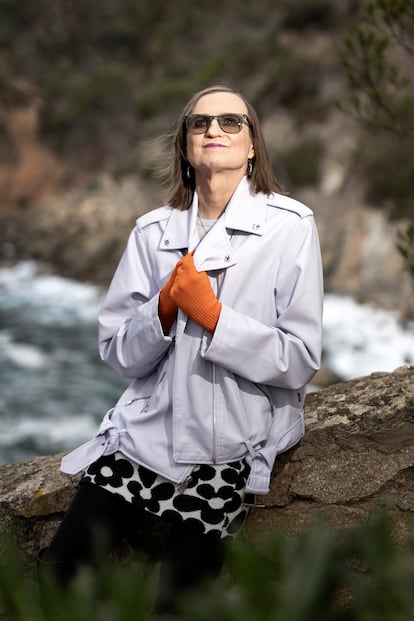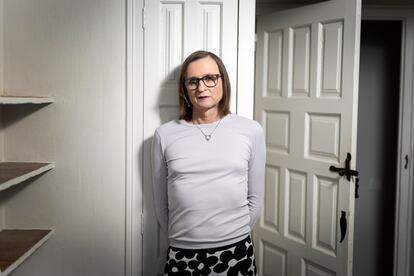McKenzie Wark, essayist: ‘The world hates trans people. It doesn’t know what to do with us’
The Australian thinker, transgender activist and prominent left-wing figure went from analyzing digital culture to publishing autofiction novels such as ‘Raving,’ where she argues that dancing to techno music can open new political perspectives

McKenzie Wark (Newcastle, Australia) has been many things in her 62 years of life: a cultural and media critic, an activist, a Marxist, an advocate for a free internet, a thought theorist and a parent. From that earlier stage of her life are her books Capital is Dead (2019), General Intellects (2017) — where she analyzes the thoughts of 20 thinkers — and A Hacker Manifesto (2004), where she talks about intellectual property and divides society into two classes: hackers — the creators of information: researchers, authors, philosophers or programmers — and the vector class, those who possess, monopolizing the product of the hackers.
For the last five years, Wark has also been a trans woman. She is also the author of a couple of gritty autofiction novels: Reverse Cowgirl (2020) and Raving (2023). This subgenre of autobiographical writing, she says, helps her explain herself from within, opening a window to other forms of existence for the readers. To her credentials listed on her profile at the website of the Eugene Lang College of Liberal Arts, in New York, she has added a specialty: gender studies. During the Covid-19 pandemic, having recently transitioned, she rediscovered raves, open spaces where people dance to the beats of the electronic music set by a DJ, which have their origin in the British industrial crisis of the Thatcher years. “Experience is politics,” says Wark, a scholar of the Situationist International, and while people dance — sometimes swayed by the effect of some drug — she says that envisioning different politics and reconnecting with the collectivity is possible.
Wark receives us in something akin to paradise: Casa Sanià, an impressive three-story house hidden among the pine trees above a secluded cove on the Costa Brava, in northeast Spain. She was one of February’s four participants in the Finestres Literary Residence, a project of businessman Sergi Ferrer-Salat, owner of Ferrer Pharmaceuticals. The overcast skies enhance the scene’s beauty, steering away from the usual postcard aesthetic. Wark, in a flowered skirt and leather jacket, welcomes us into her room. There, they say, Truman Capote wrote part of In Cold Blood.
Question. You say that we live in an era of disintegration. What makes you believe so?
Answer. We could think of this era as the era of the spectacle of disintegration. The media sphere seems to be falling apart. We’re no longer able to verify information. And at the same time, we’re watching disasters unfold. So there is the disintegration. There’s the content of the media sphere, and then there’s the disintegration of the media sphere itself, both happening at the same time, which makes it extremely difficult to orient yourself as a thinking and feeling human being in terms of how one might even be able to imagine what worlds are possible.
Q. You studied the Situationist International in The Beach Beneath the Street (2011). Following its trail, you state that we can open a new political perspective in raves. Why would that happen by dancing to the rhythm of techno music surrounded by sweaty people?
A. Raves help with the antagonism that we all have towards every other person in an urban environment. You know, every time I get on the subway, I just hate everybody. Everybody’s just so annoying. And everybody’s annoying on the dance floor as well, but if you’ve been dancing for a good hour, you just sort of let that go. You know, I hate you bitches; but we’re all here together. It’s about proximity of bodies to each other. And a good rave is sideways time. It’s not future oriented. It gets you out of thinking in terms of a future goal and the struggle to attain it. It’s not about that because there might not even be any future. You feel time scroll out sideways and intensify. And then you sort of stagger out at 9:00 a.m. and you’re like: “The sun’s up, what just happened?” So it changes people’s relation to time.
Q. What role do drugs play there?
A. You don’t have to do that. I’m not an advocate for anybody taking drugs and I’m not judging it either; it is a place where people do that. I’m interested in spaces that aren’t about drinking alcohol. It’s a bad party drug. There are better ones. I know a lot of people who are sober; I’m a recreational drug user, but it’s not the center. You don’t have to do that.
Q. You say that raves rescued you. Why did you return to them?
A. Life in the United States is pretty bleak at the moment. And where can you hide from constant surveillance — by your fucking phone, for one thing? And yeah, I went back to rave culture. This is what I did in the 1990s. And I was saying to my trans mom [the person who helped her transition], “You know, there’s just some low level gender dysphoria and nothing works on it. The thing that works is dancing, that always just made me feel better.” And it just so happened that my trans mom was a raver, and she invited me to join her.
Q. After transitioning, you immersed yourself in autofiction. You say it is a way to show your inner structure.
A. In the Anglophone world, autofiction is like the bad genre. Everybody loves to criticize it. And I’m attracted to bad genres that people say you shouldn’t do. For me, it starts with Jean Genet and Our Lady of the Flowers. He wrote it in prison and it’s basically a set of sexual fantasies that he wrote for himself. It’s the space where Genet can exist. Another example would be Audre Lorde, a Black lesbian raised in a communist culture, somebody who doesn’t get to exist in a literary space at all. So in a sense Lorde is writing the space of possibility, in which Lorde can happen.
For trans people, there was one book that we were allowed to write forever: the classic memoir. And it always took the form of, like, “I always knew I was in the wrong body. And then I met my surgeon and my surgeon fixed me. End of story.” But that is a book for cis people. So autofiction became important; this is what makes us possible in the world.
Q. Was the change of literary style easy?
A. I’m a professor of media studies. After I came out, I stopped getting sent things in media studies and I got sent stuff in trans studies, about which I knew nothing. Just because I’m a trans person doesn’t mean I know trans studies. I had to spend a year getting up to date on that field. Now I want to do some work in trans studies as a contribution. I want to help out with that. But how did that just happen, that I got put over there in that box? I became a marked subject. I lost the respect of certain kinds of institutions because I came out.
Q. Maybe you have earned the respect of other people?
A. Because I worked for it. I had to create a different readership. And I’ve been on the road and doing interviews and doing appearances. It’s been work for the last four years. And I actually want to go back to media studies at some point and see how those things then reconnect. That’s what I’m trying to figure out here.

Q. You constantly invent words and concepts in your books.
A. Somewhere between Marx and Dada is how I learned to write. But I want to make it new. Sometimes by making words up, sometimes by just repurposing existing language. It doesn’t have to be taken too seriously.
Q. What has become of the great thinkers, like Sartre? You believe they no longer exist.
A. Maybe that’s a good thing. It’s partly maybe that the structure of the media political space doesn’t allow for it. It might partly be that we realized it’s not necessarily a good thing to be chasing after the great sages. So what’s a different way of thinking about intellectual work in the 21st century? I am more interested in what happens in the gap between how different people think. How do you maintain relationships between them while seeing that they’re also very different and have incompatible ways of thinking?
Q. At the university where you teach, they are considering selling the dean’s home to raise funds. How do you see the sector?
A. This might be the era of the end of the mass university, the post-war model, and the end of the idea of extending tertiary education to a wide chunk of the population. And one of the really decisive shifts there was that education became connected to a debt-based financialization model, and that’s really been one of the most destructive things that could have possibly happened to it.
Q. This has given donors a lot of power. At Harvard, president Claudine Gay…
A. I don’t give a rat’s ass about what happens at Harvard. Harvard is basically a hedge fund that maintains a university for tax purposes. I care about what happens at the other, 3,000 institutions, many of which are now going broke. The big state universities are no longer really state funded. This is saddling students with debt, which means they’re not engines of raising people into the middle class, like they used to be. They’re cutting humanities and social science courses, partly on ideological grounds. Often they’re things that are cheap to run and a lot of students study them, but that’s where the political pressure is coming in. The United States lives and dies by the intellectual capacity of its labor force. And we’ve decided that doesn’t matter. Educated people are less likely to vote for the far-right fascist candidates, it turns out. So there is a political campaign to end public education as we know it, because it’s not really compatible with fascism.
Q. According to The Economist, only 24 countries in the world have healthy democracies.
A. What if the default state for the modern world was authoritarian and fascist states, and democracies were the exception? We got used to thinking that this is a legacy of the Cold War, that the democratic state is some natural given that complements a capitalist economy. But what if the dominant form of state is authoritarian, and there were exceptions? The United States is not a democracy and it never was. It’s a republic. And the boundaries of it being a republic are being renegotiated even as we speak.
Q. Are you referring to the fact that some states are making it difficult for certain sectors, such as the Black population, to have the right to vote?
A. There are millions of Americans who have been denied the right to vote because they are or have been in prison, and they’re in prison for political reasons.
Q. Do you lose the right to vote when you are in prison?
A. It varies from state to state, but in a lot of parts of America you lose your civil rights. So, yeah, maybe democracies were exceptional moments, born of the power of the labor movement. The decline in the power of the labor movement tracks with the decline of democracy.
Q. How is the Marxism that you are interested in?
A. I was raised in the labor movement. The part that interests me has to do with Marx’s postulates, but without reproducing them over and over again as if 100 years of debates about every word of Capital had not passed. I find myself very much at odds with people who think they’re the keepers of the flame of whatever Marx was.
Q. Name a political change you would like to see happen.
A. I would like there to be popular social movements that are able to refuse repression. I just think that’s axiomatic [basic] for a writer. You take their side. Now you take the side of the liberation of Palestine, because that is the one that you see every day, and one is obliged to make a choice. And so you say “Free Palestine”!
Q. Has Biden, with his support for Israel, distanced himself from left-wing voters?
A. The first trap is imagining that America is a democracy. It’s not. The military runs itself, it is ungovernable. Billions of dollars just go missing, you know? No one will ever know where it went to, from the military budget. The military intelligence state is just going to do what it does and will probably punish anybody who attempts to mess with it too much. Living in America is like being held hostage. You’re just going to be gaslit. Thank God I don’t vote. I’m not a citizen.
Q. And if you could vote, what would you do?
A. You’re basically held hostage to having to vote for the Democrats. The alternative is fascism, and you have no third option. So do you want the right wing government that is complicit in genocide? Or do you want the far, far right government that will destroy the state? Every single day that I get on the subway and go around New York City, I see 20 to 30 cops who stand around in groups looking at their cell phones doing absolutely nothing — except costing us billions of dollars. And when my kid goes back to school every year to a public school in New York, they have to take the paper and the pens that we have bought, because there are none in the school.
Q. Can I ask you why you decided to transition at 57 years of age?
A. It can happen to anybody at any time of life. The first time I thought about it I was about 18 and I met trans women for the first time by accident. They were sex workers. And I’m like, “I can’t do that. I’m not going to live very long if I do that.” There’s people who absolutely can’t hide it, but I could hide it. I immersed myself in writing for 30 years, I could do that. To avoid it. And in some ways that damaged my life. But I’m alive, you know? There aren’t many trans women in their early 60s or older. People didn’t survive the violence, the mental health issues, the addiction, the HIV/AIDS crisis. I’m lucky enough to have survived that as it is. I would have had much less chance of getting through that if I’d come out. So yeah, fear was... it was a big motivator to not do it for a long time. I feel a lot of compassion for people who can’t hide it.
Q. Compassion? Not admiration?
A. Both. It’s very important among trans people to not judge each other’s choices. Like, what are you going to do to survive, honey? Because the world hates us. The world fucking hates us and doesn’t know what to do with us.
Q. In Oklahoma, which has very restrictive laws for trans people, a young non-binary teen, Nex, has allegedly died from being beaten by classmates who bullied him.
A. Intergenerational trans culture is really important, and a lot of young trans people don’t have that. They’re very isolated, and there are institutions that are indifferent or actively hostile to them. It’s not good at the best of times, but to then have like entire fascist campaigns to make us the enemy of civilization is really not helpful, you know? Because the reality is that we’ve always existed in different ways. Any culture you can name has got men and women plus X plus something else plus some other category. It’s only under specific circumstances that the repression of us becomes what’s necessary to sustain the illusion that the other two genders are natural. You create the illusion that the two cis genders are natural by violence against the thing that doesn’t fit. Thank you, Catholic Church. You’ve had your thousand years of burning us at the stake.
Sign up for our weekly newsletter to get more English-language news coverage from EL PAÍS USA Edition
Tu suscripción se está usando en otro dispositivo
¿Quieres añadir otro usuario a tu suscripción?
Si continúas leyendo en este dispositivo, no se podrá leer en el otro.
FlechaTu suscripción se está usando en otro dispositivo y solo puedes acceder a EL PAÍS desde un dispositivo a la vez.
Si quieres compartir tu cuenta, cambia tu suscripción a la modalidad Premium, así podrás añadir otro usuario. Cada uno accederá con su propia cuenta de email, lo que os permitirá personalizar vuestra experiencia en EL PAÍS.
¿Tienes una suscripción de empresa? Accede aquí para contratar más cuentas.
En el caso de no saber quién está usando tu cuenta, te recomendamos cambiar tu contraseña aquí.
Si decides continuar compartiendo tu cuenta, este mensaje se mostrará en tu dispositivo y en el de la otra persona que está usando tu cuenta de forma indefinida, afectando a tu experiencia de lectura. Puedes consultar aquí los términos y condiciones de la suscripción digital.









































